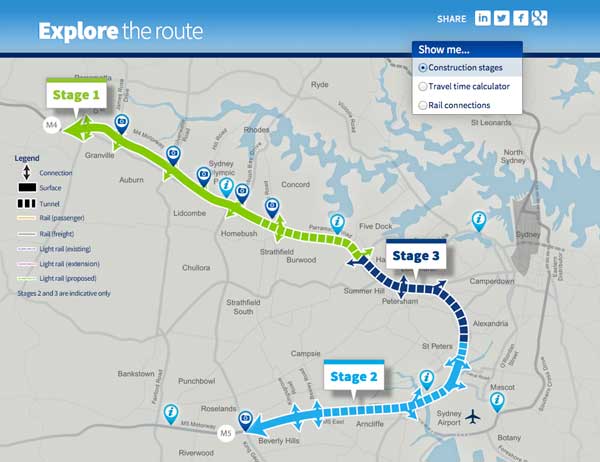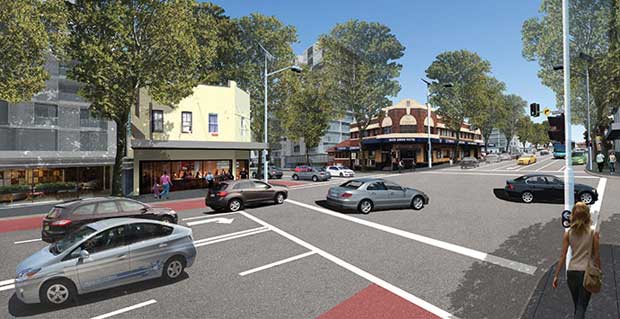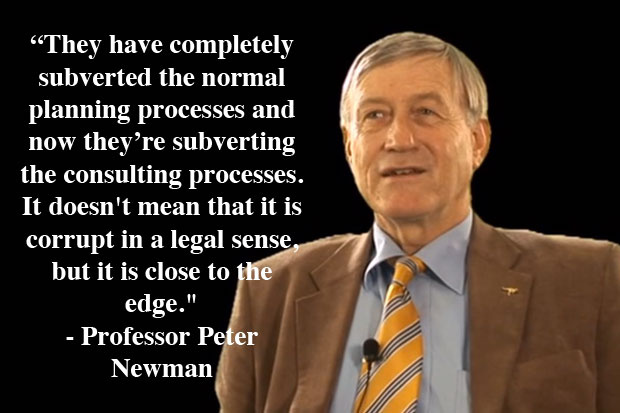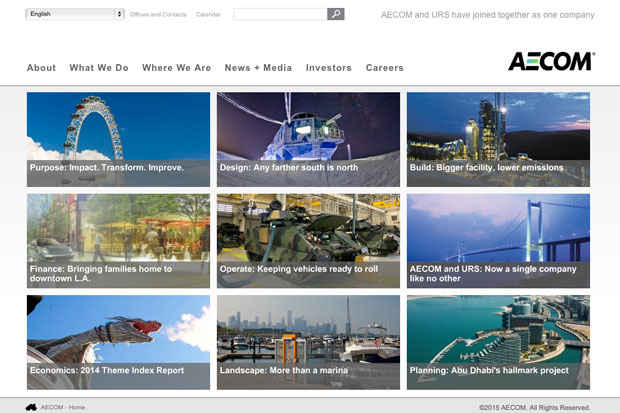The company contracted to assess environmental impacts of a controversial WestConnex tunnel proposed for the Inner West of Sydney has deep interests in the planning and construction of the $15 billion motorway project, raising questions about the independence and integrity of the planning assessment process.
The same firm is the subject of an ongoing legal action in Queensland – more than 650 investors are suing for $150 million, claiming the company’s traffic predictions for a privately-owned toll-road in Brisbane were substantially inflated.
Global engineering, energy and design company AECOM has been paid $1.6 million to provide the NSW Baird government an assessment of the environmental risks for the M4 East tunnel, from Homebush to Sydney’s Inner West (Stage 1 of WestConnex).
AECOM has previously partnered with Leighton Contractors, which is part of the successful joint venture winning bid with John Holland and Samsung C&T to construct the Westconnex M4 East, announced by the Baird government today. AECOM and Leightons been joint contruction partners in other road building contracts, and jointly bid for the East West Link in Melbourne but withdrew the bid on the grounds that it was too risky.
This is one of six contracts the company has been awarded by the WestConnex Delivery Authority (WDA) over the last 18 months. The contracts have a combined value of over $9 million, and cover a range of services.
AECOM was involved with preparing WDA’s proposal for Stage 2 of WestConnex (the M5 tunnel) and is involved in business and traffic estimates for other parts of the project. The M4 East environmental assessment contract itself includes broader services, described as “Design Development & Communications Services” on the Contract Award Notice.

AECOM was the only company that tendered for this contract, which was awarded in January 2014.
The requirements for AECOM’s EIS include a detailed consideration of the tunnel’s impact on noise, air and water quality, biodiversity and a description of how the project applies principles of ecological sustainability. It must also report the impacts on traffic, transport, social and economic impacts and include “analysis of feasible alternatives to carrying out the project and project justifications”.
At least one other company, Pacific Environment Operations Pty Ltd, has a contract for specialist assessment on this stage of WestConnex.
Although its assessment is yet to be published or any feedback received, AECOM already endorses the motorway on its website. It claims, “WestConnex will assist in making Sydney a more liveable city by reconnecting communities, enhancing centres and significantly improving the urban domain along Parramatta Road” and that it will “provide welcome relief from congestion on the M4 and Parramatta Road…”
These claims are hotly contested. An independent study commissioned by City of Sydney found that WestConnex will actually increase traffic congestion on Parramatta Road. In May the SMH reported that the WDA’s own traffic assessments show that the $15 billion project will not stop Sydney traffic from worsening.
AECOM’s other work on WestConnex includes:
• a contract to prepared WDA’s proposal for a new Stage 2 M5 East tunnel
• a $4.9 million contract to conduct geotechnical investigations for the M5 Tunnel from South West Sydney to St Peters
• a $700,000 contract for “Traffic Director” services
• and two contracts worth more than $777,000 to work on the Stage 3 of the motorway, which is a tunnel linking the M5 and M4.
These Stage 3 contracts include design engineering, business development, and environmental and technical services for the tunnel, about which almost no information is available.
In addition to AECOM’s contracts, the company of ex-CEO of AECOM Australia and New Zealand, Michael Batchelor, who left AECOM in May 2014 to establish a new consultancy Nimbus Consulting Pty Ltd, is being paid $445,000 between January and July this year to provide an “interface between industry and the government”.

Mr Batchelor describes this on his LinkedIn profile as providing advice to NSW Roads and Maritime Services on its governance of, and interface with, WestConnex.
When contacted by New Matilda, Batchelor sent a message to say that as a “humble consultant to RMS”, he was not authorised to speak on behalf of WDA and suggested we contact WestConnex.
There is no inference from New Matilda that Mr Batchelor is in any way involved in any corrupt conduct.
More broadly, very little information about NSW government contracts is available to the public.
Notices for contracts worth more than $150,000 are published on the NSW Government eTendering website, but are removed soon after a contracts expires. This is in stark contrast to the Federal register, where historic contracts remain available. The NSW system makes it more difficult for the public to track the development process in NSW.
Once delivered, WDA will lodge AECOM’s report with the NSW Department of Planning and Environment. There will then be a one month opportunity for public feedback and submissions. The NSW Minister for Planning, Rob Stokes, is responsible for final approval of the project.
In response to questions from New Matilda about whether he was concerned about a lack of independence on the part of AECOM, Minister Stokes responded, “My role and that of the Department of Planning & Environment is to assess the merit of any project against a strict set of environmental and social conditions….”
“This role is blind to whomever the proponent is, be it a private organisation or a public authority.”
New Matilda tried to interview AECOM, and sent written questions. No response had been received at the time of publication.
Asked to comment on a hypothetical scenario in which a company responsible for environmental assessment processes was also responsible for preparing a proposal for other aspects of a major project, transport planning expert and Professor of Sustainability at Curtin University, Peter Newman told New Matilda: “Goodness me. It’s makes it sounds like they (a hypothetical company) are being used as part of the proponent’s case if they are also doing the assessment.
“It really is pushing things….”
Newman was a board member of Infrastructure Australia at the time the motorway was first proposed. He is also a member of a Scientific Advisory Committee with the United Nations Educational, Scientific and Cultural Organization (UNESCO).
Professor Newman considers that WestConnex only became a serious proposition when Prime Minister Tony Abbott took up the issue while still in opposition, and that the project is highly politicised.
He described the planning processes around WestConnex as, “very tight knit… (this scenario) doesn’t surprise me because I was involved in the planning side. The planning was really very, very light – just a few ideas being thrown together without any serious detailed work being done, and all the detail that was done showed very poor cost-benefit ratio.
“They have completely subverted the normal planning processes and now they’re subverting the consulting processes.
“It’s corrupting the process, that is what you can say. It doesn’t mean that it is corrupt in a legal sense, but it is close to the edge.”
Another unusual feature of the M4 East is that while the EIS must look at “feasible alternatives” and “project justifications”, the contracts for construction will be awarded before it’s complete or planning approval has been granted.

Asked whether he would prefer to grant approval before the contract was awarded or whether he had any concerns about the process, Minister Stokes responded, “Timing of contracts is entirely the proponent’s (WDA) responsibility and is not a consideration in the assessment process. However it is clear that no work on any project is able to commence without planning approval…. I do not intend to treat this project differently to any other project that comes to me or the Department.”
Professor Newman told New Matilda that awarding the contracts before approvals is given is “tending to happen now although environmental approvals were usually considered to be part of the work you needed to do before you gave out contracts. But now it’s all just considered to be ‘green tape’ … contracts have to be let so they (roads) can be built or at least begun before the next election”.
“So it’s a highly political process, making most planning processes and most environmental processes reduced to a silly kind of ‘getting in the way’ type processes, when everyone knows the real job is to get out there and build the road.”
Court case against AECOM
While AECOM has been contracted for “Traffic Director” services on WestConnex in Sydney, it faces a class action over its traffic forecasts for the failed Clem 7 tunnel in Brisbane.
Brisbane’s Clem7 RiverCity tunnel carried less than one quarter of the traffic forecasted after it opened in 2010. Legal firm Maurice Blackburn is representing 650 investors who are seeking to recover losses of more than $150 million from AECOM.
According to Maurice Blackburn’s website, the case alleges that AECOM made forecasts without reasonable grounds, and left critical information out of its report published in RiverCity’s Disclosure Statements.
It also allegedly failed to reveal that earlier traffic forecasts it had developed for Brisbane City Council showed traffic volumes substantially lower than those in the RiverCity Disclosure Statements.
AECOM is defending the action and has made cross claims against directors of RiverCity. The case is listed for hearing in 2016. Planning Minister Stokes did not respond to a question about whether he was aware of this court action.
Who is AECOM?
AECOM Australia Pty Ltd is one of the Australian firms that make up the AECOM global corporate network headquartered in New York. AECOM reports that its companies brought in over $19 billion in revenue in the 12 months ending in September 2014.
Like other global engineering companies, it has grown through a series of takeovers, culminating in its $7.6 billion takeover of rival URS last year. The company’s website lists a wide range of services in design, engineering, construction, mining, oil and gas and services to the intelligence community.
In 2010, AECOM Philippines conducted the feasibility for a controversial open cut gold mine involving Australian companies. As reported by New Matilda last year, the mine has been the cause of political and environmental conflict in the Philippines.
In Australia, AECOM strongly promotes its company as a source of innovative and sustainable design. Tonight AECOM are hosting a Vivid Sydney event “Reconnecting Sydney: How will emerging technology connect Sydney and change the way we move?”. While tickets are sold out, you can follow the event on Twitter with #ReconnectingSydney.
AECOM has been expanding its government services in Australia. The Federal Government contracts register lists 180 contracts commenced with AECOM since the beginning of 2013. Of those contracts, 125 – with an estimated value of over $66.5 million – are related to defence, the company’s main area of focus at the federal level.
Like most big engineering companies, AECOM is involved in many joint ventures, including with other tenderers for WestConnex’s major construction contracts. It was involved in a bid for the aborted East West Link with Leighton Holdings. The bid was withdrawn because the project was considered too risky.

Concerns about consulting and decision-making practices steering WestConnex are fueling strong community campaigns against the motorway. In particular, there are widespread concerns over the secrecy the Baird government has maintained around its business case, which will be partially released in July.
Last week, Minister Stokes announced that the UrbanGrowth NSW Parramatta Road Urban Renewal strategy – which was linked to WestConnex – would be redone later this year.
According to the UrbanGrowth NSW Community feedback report, strong public opposition to the WestConnex was expressed, and major themes included a strong preference for public transport, and dissatisfaction with community feedback processes.
But despite the negative focus on WestConnex, asked whether the decision to redo the report would have any impact, a spokesperson for the NSW Planning and Environment Department told New Matilda, “State significant infrastructure applications are assessed against clear rules, applied consistently. The assessment process and rules remain the same.”
Yesterday, SMH reported internal problems with the governance of WestConnex, resulting in the sudden merger of its separate financing arm with the WDA. One of the issues behind the move is conflict over the control of the planning processes.
With the Greens and No WestConnex community action groups demanding a halt to the project so that a parliamentary inquiry can investigate, the determination of the Baird government to press ahead with the project is challenged.
Additional research by Marina Currie. Both authors have attended anti-WestConnex protests.
** New Matilda is a small, independent Australian media outlet. We rely almost entirely on reader subscriptions and donations to survive. To subscribe (with some great free gifts) click here, or to donate any amount you like, you can click here. Your support helps us shine a light in dark places.
Donate To New Matilda
New Matilda is a small, independent media outlet. We survive through reader contributions, and never losing a lawsuit. If you got something from this article, giving something back helps us to continue speaking truth to power. Every little bit counts.





